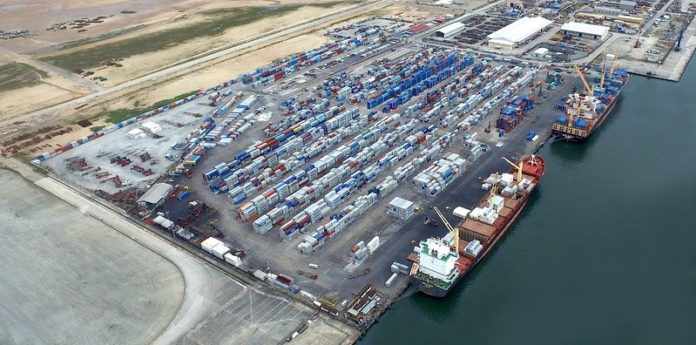Examining the Africa region as a key shipping hub, Danish maritime data analysis firm Sea-Intelligence has studied the vessel deployments by major liner operators, particularly the world’s largest, MSC, on services covering the region.
This past week, MSC announced the deployment of 23,000+ TEU vessels on its Asia-West Africa service, “Africa Express.” Currently, the largest vessel on this service has a capacity of 16,600 TEUs, with the average vessel size at 14,465 TEUs.
These new deployments will increase the nominal capacity of the service by 50%, marking a significant growth. The first of these vessels, MSC Diletta, was shifted from the Asia-North Europe “Lion” service, where it was replaced by a smaller 15,500 TEU vessel.
“This is a surprising development, considering that in recent years, the trend has been the opposite—smaller vessels on Asia-North Europe routes being replaced by larger ones,” noted the Danish analysts.

The figure shows the average and maximum vessel size of vessels deployed on deep-sea services to West Africa. According to the report, since June 2022, the average vessel size to West Africa has grown by 50%.
Sea-Intelligence noted that shipping lines have also been deploying progressively larger container ships to the region, with the largest existing vessels (prior to MSC’s latest deployments) exceeding 16,000 TEUs.
Since January 2024, 26 vessels with capacities of 15,000 TEUs and above have been deployed on trades connecting to West Africa, 22 of which are operated by MSC on their standalone services. Additionally, these vessels were deployed across four services, three of which are MSC’s standalone services. This highlights the Swiss/Italian ocean carrier’s efforts to strengthen its West Africa network and its anticipation of even stronger growth opportunities in the region.
“The economic indicators for Africa help explain why,” pointed out Alan Murphy, CEO of Sea-Intelligence. He noted that Africa’s population reached 1.5 billion in 2024 and is expected to grow to 2.5 billion by 2050. This would increase Africa’s share of the global population to 28%.
Moreover, 30% of Africa’s 1.5 billion population resides in West Africa.
At the same time, over the last 18 months, 56% of the ports in West Africa have experienced increased connectivity. In economic terms, year-on-year growth in Sub-Saharan Africa (the only African region for which the IMF publishes economic growth figures) is outpacing both global growth and that of advanced economies, added Murphy.







